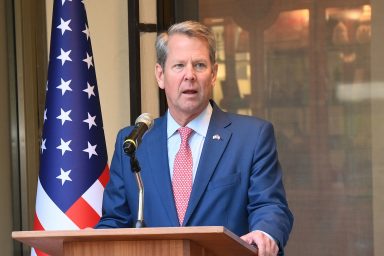Despite coming from a history (and family) of centrism, Hillary Clinton has in recent days begun weaving progressive causes into her stump speech for the Democratic Primary. On Sunday she took to the stage in Iowa and joined Congressional Democrats in her opposition to fast track authority for the Trans-Pacific Partnership (TPP), putting her at odds with her former boss (and rival), President Barack Obama.
It’s not shocking to see the leading candidate for the Democratic nomination take stances that fire up the liberal base. What is noteworthy are some comments from her opponent just days before that may have led to the newfound fire in her belly.
Clinton’s opponent, Sen. Bernie Sanders (I-VT), took the former Secretary to task for her lack of a vocal stance on the issue. “We need her to speak out,” the senator told reporters last Thursday morning. “Right Now.”
And just three days later, she did.
TPP isn’t the only issue on which the Clinton campaign is letting Sanders set the terms for debate. On a trip to South Carolina this Wednesday, Clinton unveiled a plan to provide tax credits for businesses that hire young workers in apprenticeship programs, aimed at fighting youth unemployment.
It’s just the kind of issue that could mobilize a liberal base looking to deal with the problems of inequality and youth unemployment in the wake of the Great Recession. In fact, it’s such a winner for a Democratic candidate that Bernie Sanders already put forward a $5.5 billion job-training program two weeks before.
Of course there’s nothing strange about candidates for the same party’s nomination agreeing on some major issues, and even borrowing each other’s solutions wholesale. What is more surprising is that Hillary Clinton’s campaign, despite leading Sanders in national polls by a more than 5-to-1 margin, looks as though she feels the need to let him set the terms of the debate.
Josh Voorhees, writing for Slate, suggests that Clinton’s sudden interest in TPP can be seen as clear proof that the Clinton campaign sees Sanders as a real threat. He points to the way that Clinton’s remarks clash with her views on free trade as Secretary of State and her support for her husband’s signing of NAFTA.
“Clinton would prefer to sit this one out entirely if she could. The fact that she’s not tells us something about the growing importance of Sanders’ insurgent campaign. The Vermont senator may never seriously challenge her for the Democratic nomination, but it’s now clear that he can challenge her on the trail.”
Hillary Clinton’s role as the barely-opposed Democratic frontrunner has long been a source of worry for some of the populist-progressive wings of the Democratic Party–just look at the popularity of efforts to draft Elizabeth Warren into the campaign. There has been a concern among the liberal base of the party that Clinton, usually seen as a third-way centrist like her husband, would be a disappointing standard bearer for progressive causes and has too many ties to Wall Street.
The hope among progressives has been that the Sanders candidacy, though a long-shot in the primary and beyond a Hail Mary in the general, could lead to a reframing of debates, and give progressive issues prime seating on the Clinton campaign bus.
With Clinton seemingly directly responding to Sanders on issues like TPP and youth apprenticeship programs, it seems that the dreams of progressives are coming true months before the two candidates even meet for a debate. With Sanders seeing bumps in New Hampshire polls that make him competitive with Clinton for that early state’s primary and surges in enthusiasm among South Carolina Democrats, it looks like the Clinton campaign may be right to take the 73-year-old self-declared socialist seriously.
Clinton is still the odds-on favorite to win the nomination–that 5-to-1 margin in national polls is a pretty large one–but it’s nevertheless an odd place to see her campaign. It’s rare that a frontrunner for president is so clearly seen playing follow-the-leader.
—Jon Hecht


